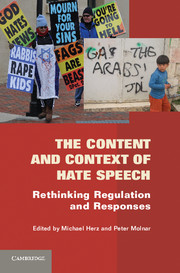Book contents
- Frontmatter
- Contents
- Contributors
- Foreword: Hate Speech and the Coming Death of the International Standard before It Was Born (Complaints of a Watchdog)
- Foreword: Hate Speech and Common Sense
- Acknowledgments
- Introduction
- Part I Overviews
- 1 Interview with Robert Post
- 2 Is There a Case for Banning Hate Speech?
- 3 Hate Speech
- 4 Interview with Kenan Malik
- 5 Hate Speech and the Demos
- 6 On American Hate Speech Law
- Part II Refinements and Distinctions
- Part III Equality and Fear
- Part IV International Law
- Index
- References
1 - Interview with Robert Post
Published online by Cambridge University Press: 05 June 2012
- Frontmatter
- Contents
- Contributors
- Foreword: Hate Speech and the Coming Death of the International Standard before It Was Born (Complaints of a Watchdog)
- Foreword: Hate Speech and Common Sense
- Acknowledgments
- Introduction
- Part I Overviews
- 1 Interview with Robert Post
- 2 Is There a Case for Banning Hate Speech?
- 3 Hate Speech
- 4 Interview with Kenan Malik
- 5 Hate Speech and the Demos
- 6 On American Hate Speech Law
- Part II Refinements and Distinctions
- Part III Equality and Fear
- Part IV International Law
- Index
- References
Summary
Peter Molnar: When I first came to the United States, a friend told me that the supposedly strong protection of freedom of speech in this country is simply a myth. Would you agree?
Robert Post: I suppose it would depend upon what one means by “myth.” In certain communicative contexts – like the Internet, newspapers, magazines, or movies – constitutional protections for speech are quite robust. But in many other settings there is far less, if any, constitutional protection. So can we conclude that the reputation of a strong First Amendment is merely a myth?
PM: More narrowly, then: It is often stated that in the United States “hate speech” is constitutionally immune from regulation. Is this correct?
RP: In many settings speech that is demeaning or degrading to particular minorities or genders or sexual orientations is regulated in the U.S. with few, if any, constitutional impediments. In private settings, for example, where there is no state action, constitutional restrictions do not apply. In such private settings hate speech can be regulated without constitutional constraint. There are also many public settings in which hate speech can be and is suppressed regularly and effectively. These tend to be settings in which the regulation of hate speech does not compromise public discourse.
PM: For example?
RP: In courtrooms, for example. Attorneys and judges will be penalized for hateful expression. So will teachers and students in public elementary and high schools, and even, in some contexts, in public universities. Prisoners, guards, and administrators will be regulated for hate speech in prisons, as will government employees in bureaucracies. There are lots and lots of settings in which in the United States government regulates or prohibits hate speech and First Amendment issues are not thought to arise.
- Type
- Chapter
- Information
- The Content and Context of Hate SpeechRethinking Regulation and Responses, pp. 11 - 36Publisher: Cambridge University PressPrint publication year: 2012
References
- 2
- Cited by



